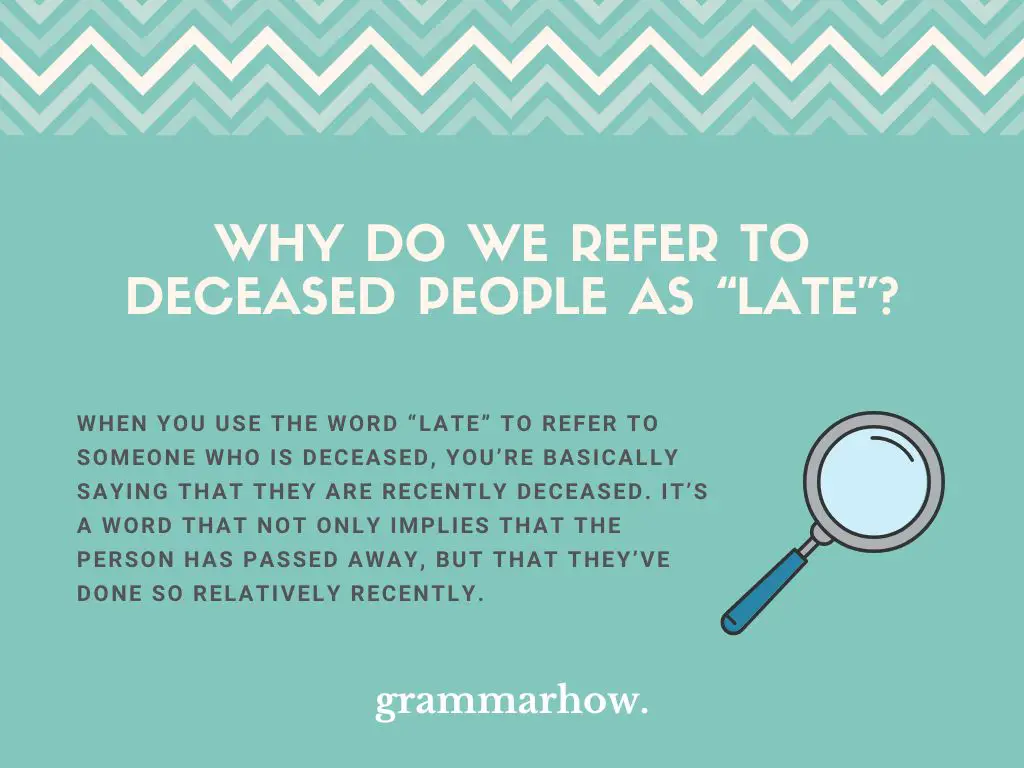English has plenty of expressions that we use every day without really thinking about why they’re used in that particular way. For example, why is the word “late” used to refer to deceased people? And when is it appropriate to use it? This article will answer these questions.
Why Do We Refer to Deceased People as “Late”?
When you use the word “late” to refer to someone who is deceased, you’re basically saying that they are recently deceased. It’s a word that not only implies that the person has passed away, but that they’ve done so relatively recently.

While there aren’t any hard rules on how long you can use the word to refer to the deceased, people use it around a decade or two decades after the person has passed away.
The meaning of the word, therefore, is simply either “dead” or more specifically “recently dead”. It’s a good word to use to indicate to other people present that the person has passed away.
Furthermore, this is the sort of word that you can use instead of “dead” because it’s seen as more socially acceptable. After all, “dead” is a very strong word that people often would rather avoid.
For How Long Is It Appropriate to Refer to Deceased People as “Late”
There aren’t any specific rules for how long it’s socially acceptable to refer to someone as “late”, but generally people use it somewhere in the decade to two decades from now. However, this varies from person to person, as some would only use it in the first year.
An interesting fact about using the word “late” to refer to people who have passed away is that the length of time in which its appropriate might vary depending on how noteworthy the person is.
For example, you wouldn’t use the word “late” to talk about a public figure that died in the past century, for example, you wouldn’t say “the late James Dean”.
However, what you would say is “my late wife”, even if she had passed away at the exact same time as James Dean.
This is because when a death becomes generalized cultural knowledge, the usage of “late” becomes unnecessary.
Origin of “Late” for Deceased People
The usage of the word “late” to refer to deceased people stems from around the 13th century or so. This is because it was that century in which the word “late” started getting its use as a synonym for “recently”, and so people used it to refer to the deceased.
Though the generalized meaning of “late” to refer to something that has occurred recently has been lost, the word “late” is still very much utilized to refer to people who have recently passed away.
It’s hard to know the precise reason why the broad meaning of “late” as “recently” has been lost, and yet the specific meaning of “late” as “recently deceased” has stayed after all these centuries.
One likely theory, however, is the fact that “late” is seen as a more formal word than merely “dead”, and “passed away” is two words, and therefore less efficient.
People like to avoid saying the word “dead”, and “late” is a very useful term for those situations in which otherwise you’d be forced to use that word.
Is It “Late” or “The Late”?
Broadly speaking we tend to use “the late” instead of “late”. This is because the word is used as part of a longer title generally, such as “the late John Smith”. “Late” is used as any other descriptive adjective, and nothing about it makes it special in any regard.
Therefore, when you add “late” as an adjective to someone, then you need to start that sentence with “the”, same as you would with any other descriptive adjective.
You wouldn’t use the “the” article in situations in which you are using other terms such as, for example, “my” or “his”.
How to Use “Late” For Deceased People in a Sentence
“Late” is the sort of term that you will want to be sure of how to use in a sentence, because it’s a word that is evidently used in contexts that require gravity, and making a mistake in such a context would be a mistake. Here are some example sentences:
- The late Michael Adams, who was the Doctor for this university, left an important legacy.
- My late wife who passed away a decade ago always used to say that we should retire.
- His late husband used to be a really big proponent of this particular school of economics.
- The late Jimmy McGill was a charming man, and he will always be remembered as one.
- His late pet dog “Perry” was a very kind, relaxed animal, who would get along with everyone.

Martin holds a Master’s degree in Finance and International Business. He has six years of experience in professional communication with clients, executives, and colleagues. Furthermore, he has teaching experience from Aarhus University. Martin has been featured as an expert in communication and teaching on Forbes and Shopify. Read more about Martin here.
